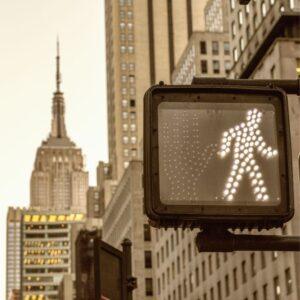The number of accidents resulting from negligent cab, Uber, or Lyft drivers is staggering. In particular for ridesharing app drivers and cabbies that share medallions, lack of adequate training, long hours, and the rush to get to the next fare or client as quickly as possible (for drivers to earn a living) have all led to catastrophic accidents and devastating injuries.
Ridesharing comes with dangers for everyone on the road, and it can create legal complications when an accident occurs. For example, a study by the University of Chicago and Rice University suggests that ridesharing services may actually increase traffic accidents and fatalities, especially in larger cities, by putting more cars on the road and creating more stop-start traffic. And poorly vetted rideshare drivers can increase the risk to passengers’ personal safety. In fact, an internal investigation by Uber found the company received nearly 6,000 reports from passengers alleging serious sexual assault in the U.S. during 2017 and 2018.
If you have been injured as a passenger or the operator of another vehicle in an auto accident involving an Uber or Lyft vehicle in Long Island, protect your legal rights by speaking with an attorney with Chaikin Trial Group today. Our law firm has successfully negotiated and litigated countless Long Island rideshare accident cases for victims. We can ensure you receive the legal help you need and can go after the compensation you deserve.
Below is an overview of what to do right now if you’ve been injured as a passenger, driver, pedestrian or cyclist in a rideshare accident. The overlapping rideshare laws and regulations in Long Island and the state are complex, and we discuss some of them below that may apply to your case. To understand exactly how the facts surrounding your accident could affect your individual rideshare settlement, you owe it to yourself to speak with an experienced Long Island rideshare accident attorney today.
What to Do Following a Lyft, Uber, or Taxi Accident?
If you are involved in an Uber, Lyft, or taxi accident, you need to make sure you take specific actions after the crash. These steps can ensure that you stay safe and that your legal rights are protected.
1. Call 911: You need to call 911 following an Uber, Lyft, or taxi accident. The EMS can provide you with any necessary emergency medical treatments, while the police officers will investigate the accident scene and document their findings in their police report. If you decide to pursue a legal claim, this report can provide you with vital evidence regarding what happened and who was involved.
2. Obtain Evidence from the Scene: If you can, try to take pictures or videos of the accident scene. Get photos of your visible injuries, the vehicles involved in the crash, any skid marks on the road, the weather conditions at the time of the accident, and any other pieces of evidence that can help show what happened.
3. Get Driver Information: Following the accident, make sure you get the names, contact information, insurance information, and driver’s license number from every motorist involved in the crash.
4. Report the accident through the rideshare app or by phone. Uber and Lyft both have straightforward methods for riders to report an accident they have been involved in through their apps or by calling customer service.
5. Get Witness Information: If any individual at the scene saw what happened, get their name and phone number. Their pictures and statements can provide you with crucial information if you decide to pursue a legal claim.
6. Get Examined by a Medical Care Professional: Even if your injuries appear to be minor, you still need to get checked out by a medical professional. These physicians can confirm that you do not have any hidden injuries and provide you the treatments you need. Additionally, these doctors will document their findings in their medical report. This report can show what injuries you suffered due to the accident and the extent of these injuries.
7. Contact an Experienced Personal Injury Attorney: Uber, Lyft, and taxi accident claims are complicated. That is why it is imperative to start collecting evidence as soon as possible following the crash. For these reasons, you need to contact an experienced car accident lawyer promptly. These lawyers can get to work investigating the accident and gathering the information you need to prove your claim.
The Statute of Limitations for an Uber, Lyft, and Taxi Accident Claim
The statute of limitation is a law that dictates how much time you have to initiate legal proceedings for an alleged offense. In Long Island, the statute of limitations for a personal injury is three years from the accident date. However, numerous exceptions to this rule can shorten or lengthen your file time. For instance, if the accident involved a death, you only have two years to file a wrongful death claim. Or if your case is against a municipality, then the time will be even shorter. That is why you need to contact an experienced rideshare accident lawyer immediately following your accident. These lawyers can quickly determine how much time you have to file your case and ensure all your legal motions are filed promptly and accurately.
How Much is an Uber, Lyft, and Taxi Accident Claim Worth?
Unfortunately, as each car accident is unique, no attorney can tell you exactly how much your case is worth. In fact, numerous factors can affect the value of your claim, including:
- The severity of your accident injury
- Any property damage to your vehicle or bike
- The type of medical treatments that are needed and the medical bills you incurred
- Will you need any future medical treatments
- Will you be able to work following the Uber, Lyft, or taxi accident
- What was the extent of your lost wages
- Do you need additional help following the accident
- Did you miss out on critical life milestones
- The credibility of the evidence and witnesses presented
When you work with the legal team of Chaikin Trial Group we can go over these factors, determine which ones may impact your claim, and prepare the best case in response, going after maximum damages.
How Can Chaikin Trial Group Help Me Following My Uber, Lyft, or Taxi Accident?
If you are looking to file an Uber, Lyft, or taxi accident claim, you need legal help that you can trust. Not only are these types of accidents incredibly complicated and require detailed evidence to show fault and damages, but they also require a solid understanding of New York State laws. However, when you retain an experienced personal injury lawyer from Chaikin Trial Group, our attorneys can:
1. Go Over Your Concerns: We can go over your case in detail, answer any questions you have, and figure out which legal options you can pursue.
2. Investigate the Accident: We can promptly and thoroughly investigate your accident, gather critical evidence, and interview relevant witnesses that can help substantiate your claims.
3. Handle Negotiations: Discussing your case with the insurance company or the defense attorneys can be stressful. However, when our lawyers step in, we can handle these negotiations and discussions for you. Ensuring you do not say anything that can impact your claim.
4. Take Your Case To Trial: If the other side is unwilling to negotiate, we can take your case to trial and fight for the compensation you need.
If you or a loved one has been injured in an Uber, Lyft, or taxi accident. Do not wait any longer. Contact Chaikin Trial Group for a free case evaluation today and let our attorneys fight for the fair compensation you deserve.
Rideshare Driver Requirements
Uber and Lyft drivers must meet the following to use their rideshare platforms:
- Meet the minimum age to drive a rideshare vehicle for the city or region
- Have a valid US driver’s license
- Use an eligible 4-door vehicle
- Proof of residency in your city, state, or province
- Proof of vehicle insurance if you plan to drive your own car
- Uber also requires drivers have at least one year of licensed driving experience in the US (or 3 years if the driver is under 23 years old)
- A background check, including driving record and criminal history (both rideshare apps annually perform updated criminal background checks and DMV checks on all drivers)
- Lyft drivers must also complete a Community Safety Education program before driving to prevent sexual harassment and violence.
Reliance on Tips and Dangerous Driving
Rideshare apps keep anywhere from 25 to 40 percent of each fare processed through their app. So drivers depend on tips for their livelihood. They must cater to passengers who at times can be in a hurry and rush their driver. Unfortunately, this can encourage some Uber and Lyft drivers to make maneuvers (abrupt stops, turns and lane changes in heavy traffic without signalling, for example) that put other drivers, pedestrians and cyclists — not to mention themselves and their passengers — at significant risk. As long as rideshare drivers are scrambling to please a fare or get to the next fare as quickly as possible (frequent illegal U-turns have also been a problem), we’ll all face heightened risk of accidents on Long Island roadways.
Uber and Lyft Driver Classification & Insurance
Uber and Lyft don’t own or operate the cars hailed by their rideshare app. Both of these billion-dollar corporations go to great lengths to avoid classifying their drivers as employees. Instead, they prefer to treat drivers as independent contractors. This allows both companies to avoid responsibility for accidents or damage that happen when drivers are working. Under New York State law an employer is usually liable for damages caused by an employee. Independent contractors, however, are normally responsible for damages caused by their own negligence.
In Long Island, however, rideshare drivers are required to meet the same standards that taxi and other for-hire vehicles must meet. That includes higher levels of accident insurance and a higher level of scrutiny to pass safety inspections.
Legal challenges and legislative efforts are underway to challenge rideshare driver classification in various states across the country. And it remains to be seen if rideshare companies will continue to shield themselves with the “independent contractor” argument.
Hours of Service for Rideshare Drivers
In order to protect drivers, passengers and everyone on our roadways, ridesharing apps have created limits on the hours of service drivers may put in on their apps.
Both Uber and Lyft require drivers to take a full, uninterrupted 6-hour break for every 12 hours they are in driver mode. These 12 hours in driver mode do not have to be consecutive. Once the Uber or Lyft driver has been in driver mode for 12 hours, the app will prevent the driver from going online until he or she has taken this mandatory 6-hour break.
In addition to mandatory breaks required from Uber and Lyft, New York City regulations prohibit drivers from providing rides for more than 10 hours in 24 hours. Drivers reset the 24 hours by taking a break for 8 hours. Drivers in Long Island are also prohibited from providing rides for more than 60 total hours during a calendar week.
Uber and Lyft Driver Insurance Requirements
The insurance requirements for rideshare drivers in Suffolk County are higher than those in New York State. All of Long Island Uber and Lyft vehicles, taxis, and limousines are regulated by the TLC (NYC Taxi and Limousine Commission), which puts higher insurance requirements in place.
Drivers in Long Island must meet the following insurance requirements:
- Bodily Injury Liability Coverage (BIL): $100,000 per person in a single accident or $300,000 for all persons in a single accident
- Bodily Injury Liability (BIL) Death Benefits: $50,000 per person killed in a single accident or $100,000 for all persons killed in a single accident
- Property Damage Liability (PDL): $10,000 for a single accident
- Personal Injury Protection (PIP) / No-Fault Insurance: $200,000 for a single accident
- Uninsured Motorist Bodily Injury (UMBI): $25,000 per person or $50,000 for a single accident
Outside of the five boroughs, very few Uber and Lyft drivers carry commercial auto insurance policies because they are not required to do so under New York State law, and commercial policies tend to be prohibitively expensive. This can create problems because, while premiums are higher for commercial policies, their insurance coverage is better and more appropriate for drivers using their vehicles to earn money.
Rideshare drivers outside of Long Island are only required to carry the minimum auto insurance required by the state for personal vehicles:
- Bodily Injury Liability (BIL): $25,000 per person in a single accident or $50,000 for all persons in a single accident
- Bodily Injury Liability (BIL) Death Benefits: $50,000 per person killed in a single accident
- $100,000 for all persons killed in a single accident
- Property Damage Liability (PDL): $10,000 for a single accident
- Personal Injury Protection (PIP) / No-Fault Insurance: $50,000 for a single accident
- Uninsured Motorist Bodily Injury (UMBI): $25,000 per person or $50,000 for a single accident
Luckily, in addition to a driver’s personal auto insurance, ridesharing apps carry insurance. For insurance purposes, a driver’s time is divided into three phases and which insurance covers an accident and at what amount depends on which phase the driver is in.
Offline. The driver’s personal auto insurance policy applies to any accident that takes place when the driver app is turned off.
Available or waiting for a ride request.
If an accident occurs when the driver app is turned on, a driver’s personal auto insurance will likely still apply, but the rideshare corporation also maintains third-party liability insurance for drivers that may apply. For example, if a Lyft driver strikes a pedestrian while circling a congested block waiting for a fare, the driver’s personal auto insurance policy would likely cover damages and Lyft’s third-party insurance would cover any amount that exceeds the limits of the driver’s personal auto insurance policy up to the limits below.
Uber and Lyft maintain third-party liability insurance for all drivers with the following limits:
- $50,000 in bodily injury per person
- $100,000 in bodily injury per accident
- $25,000 in property damage per accident
En route to pick up riders and during trips.
If a crash occurs when a driver is en route to pick up a rider or when a passenger is in the vehicle, the driver’s personal auto insurance policy would apply as would the following auto insurance maintained by the rideshare corporation on behalf of the driver:
- $1,000,000 third-party liability
- Uninsured/underinsured motorist bodily injury
- Contingent comprehensive and collision
Uber and Lyft Settlements
In general, if you are injured in an accident–as a passenger or other vehicle driver–in an accident involving an at-fault rideshare driver, his or her personal auto insurance will cover damages up to the maximum amount of that policy. If this policy is exhausted, then the ridesharing app’s third-party liability insurance should kick in up to $1,000,000, according to the policy coverage outlined above.
Of course, all insurance companies and corporations have teams of lawyers and adjusters that work around the clock to limit their liability and protect their bottom line. For instance, insurance companies may pressure you to admit that you are somewhat at fault for the accident. This is because, under New York State’s “comparative negligence” law, an award for damages can be reduced by a percentage equal to the percentage that a victim is found to be at fault for the accident. For example, if you are leaving work after an overnight shift and your vehicle is struck by an Uber driver making a dangerous left turn, the driver’s insurance company or the rideshare app’s insurer could claim you are partially at fault because you were driving while fatigued.
This is why it is so important to seek out a skilled attorney if you’ve been injured in a rideshare app accident. You deserve a legal team on your side with strong knowledge of New York State civil law and decades of experience winning for victims of Long Island auto accidents.
Other complicating factors may exist if you are a rideshare passenger injured in a crash. For example, Uber and Lyft both require users to agree to “terms of service” that both companies have used to deny passengers the right to a jury trial. “Arbitration” is a common way companies use to try to limit the compensation that victims receive in the event of grave injuries or wrongful death.
Who is Responsible for a Rideshare Settlement?
While the laws that govern car crash liability and personal injury liability in New York State generally apply to cases involving Uber or Lyft drivers, there are added complications that you should know from the start. If you are injured in an accident involving a rideshare driver, it pays to get legal advice from a seasoned attorney specializing in this unique type of case as soon as possible.
Determining who is the responsible party in an accident involving Uber or Lyft isn’t always straightforward. If you are injured in an accident, it might seem like the driver’s auto insurance company or the multibillion-dollar rideshare company involved will protect your interests as a rider, pedestrian or driver. But don’t count on it. Both want the fastest possible resolution, and both work to protect their bottom line first and foremost.
In general, if the rideshare driver is at fault, his or her insurance will cover damages up to the maximum amount of that policy. If this policy is exhausted, then the ridesharing app’s third-party liability insurance should kick in up to $1,000,000. But, of course, both corporations will use complicating factors, like comparative negligence, to protect their interests and keep their costs as low as possible. Furthermore, Uber and Lyft both require users to agree to “terms of service” that they have used to deny passengers the right to a jury trial. “Arbitration” is a common way companies use to try to limit the compensation that victims receive in the event of grave injuries or wrongful death.
It can be a very complex process to sort out who is responsible for paying out compensation and in what amounts when an accident involves a ridesharing app driver. You owe it to yourself and your family to speak with a skilled, dedicated legal team with a strong track record of winning for New York City and Long Island clients who have been victims of Lyft or Uber accidents.
New York State Law and Rideshare Accidents
For a free legal consultation call (212) 977-2020
Requirement to Stay at the Scene and Report Accidents
New York State law requires you to report any accident within 10 days that caused a fatality, personal injury or damage over $1,000 to the property of any one person. Failure to do so within 10 days is a misdemeanor. Your license and registration can be suspended until a report is filed.
Beyond the requirement to report, leaving the scene of an accident where an injury has occured — hit-and-run — is a serious offense in New York State. Drivers involved in an Uber, Lyft or taxi accident are required by law to stop and share insurance information with the other driver(s), pedestrian or cyclist before leaving the accident scene. If anyone is injured in the accident, the driver/s are also required to call the police and wait for an officer to file a report. Failure to do one or both can mean being charged with leaving the scene of an accident.
Leaving the scene of an accident involving injuries is a crime that can involve fines, license revocation, and even jail time. Leaving the scene of a rideshare crash involving serious injuries or death is a felony with a potential sentence of up to 7 years.
Long Island Rideshare Accident Lawyer Near Me (212) 977-2020
Types of Damages
Rideshare accident victims in New York State can seek compensation for:
- Property damage
- Medical expenses related to the accident
- Lost wages (past and future earning capacity)
- Future medical treatment and rehabilitation expenses
- Pain and suffering
- Loss of enjoyment of life
- Emotional distress
- Scarring or permanent disfigurement
Punitive damages may also be possible under New York State law, though they are less common. Punitive damages are intended to punish the responsible person to deter others from doing the same thing in the future. Punitive damages are appropriate when the actions of the person who injured you were intentionally dangerous or extremely reckless, such as a driver brazenly ignoring safety regulations, operating their vehicle under the influence of alcohol or drugs, or injuring a victim in an act of road rage. Juries can double or triple awards in the event of particularly egregious actions.
Click to contact us today
Wrongful Death
A wrongful death claim may be possible if a loved one is the victim of a fatal rideshare or taxi crash. Only a court-appointed representative of the deceased can bring a wrongful death action in Long Island. To prevail, the representative must prove the responsible party or parties:
- Acted negligently
- The negligence caused the death
- The deceased has a surviving spouse, children, or other beneficiary
- The survivor has suffered financial damage as a result
Only two types of damages can be recovered in a wrongful death case: economic loss and the conscious pain and suffering of the deceased. Survivors cannot seek damages under a wrongful death suit for their own pain and suffering caused by the death. Surviving spouses can recover the value of support and services. Children of the deceased may receive compensation for the loss of parental nurturing, guidance and education.
Call or text (212) 977-2020 or complete a Free Case Evaluation form






